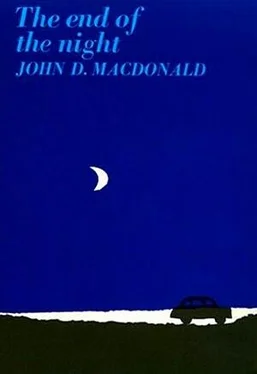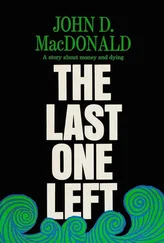You could ask a man of God about it, Paul Wister thought. You could ask Why. would say it is God’s will. He would speak of a pattern we cannot see or understand. So do not try to understand. Just accept.
This, he told himself, is the ultimate sophistry. Life is random. Luck is the factor. The good and the evil are struck down, and there is no cause to look for reasons. There is a divine plan, but it is not so minute and selective that it deals with individuals on the basis of their merit. Were that so, all men would be good, out of fear if nothing else. Those unholy four could have gathered up a tart in front of a bar. They happened to take Helen. It was chance. No blame can be assessed. And any living thing is the product of a series of intricate accidents — 46 chromosomes in each living cell — the stupendous roulette wheel of fertilization. So even as a man cannot accept the cold knowledge that all his uniqueness, all his magical identity, is the product of chance, he will not accept disaster as the other side of the casual coin. He must look for a pattern. The Lord giveth and the Lord taketh away. He gave Helen her special identity, her soul, her heart, the shape of her mouth, in a random genetic pattern. And He can take it away through another accident, and in that sense it is an offense against Him to demand in a puny and indignant way that any pattern be made clear, or even to demand that there be a pattern, discernible or not.
He thought about his daughter as the coffee grew tepid. Obviously she had jumped or fallen from the moving vehicle. Laymen believe serious injury comes only when the brittle integrity of the skull is cracked. But far more deaths occur when the skull is intact. The brain is a jelly, massively supplied with blood. A hard blow, as against an asphalt road, can do many fatal things. A few small subdural bridging veins can be torn by the abrupt movement of the mass of the brain within its bony carapace. The small subdural hemorrhage can grow slowly, exerting increasing pressure until in turn that pressure closes off other small veins by compressing the thin walls. When the dwindling supply is stopped, those starved portions of the brain die, and slowly death comes to that portion which controls the heart or the lungs.
Perhaps, he thought, if it happened that way, that would be the best thing for her. As the slow pressure built, she would be like a person drugged. She could not know what was happening to her.
He had thought of her as the Golden Girl, and he had been able to reach beyond the demands of his parental pride to see that she was a special thing in the world, a prideful, honest girl, with faults mat time would cure — such as her sometimes infuriating stubbornness, and her rather obvious rudeness toward pretentious people, and her extreme patience with those empty ones who demand of you your time and your attention, and waste it, thus wasting and spending the only truly valuable thing in life.
Though his emotions recoiled from the thought with an almost explosive anguish, he could accept the cold supposition that she was already dead. It was a hellish waste. But life had a habit of wasting the best of itself.
He rinsed the cup and turned out the lights and walked slowly to the bedroom, unknotting his tie as he went. He paused, quite surprised, just inside the bedroom door and said, “What are you doing up, honey?”
Jane Wister, in a pale-gray robe, sat in the chaise longue near her dressing table. It was a big room, a bedroom-sitting room, with space for her desk, comfortable chairs, a shelf of his books, a big glass door that opened onto a miniature terrace.
“I guess you didn’t give me enough.”
“How long have you been awake?” he asked, walking over to her.
“I don’t know. A half hour. Maybe more.” Her voice was listless.
“What are you doing? What’s that you’re looking at, Jane?”
She made a childish, instinctive effort to cover what she held with her hands, and then handed it to him. It was a folder of photographs, made like a visible file index, with overlapping glassine slots for the pictures. She had several of them, each covering different parts of their lives. This was all of the children.
He sat on the arm of the chaise where the light was better, and flipped it open at random to a picture. It was in color. Helen, a knobby twelve, stood with another girl, grinning and squinting into the camera. They each held tennis rackets and, in prominent display, tiny trophy cups.
“Remember?” Jane said. “They spelled Wister wrong on her cup when they had it engraved later. Wester, they had it. And she was furious.”
He closed the folder. “Why do this to yourself, honey?”
“I lay there, remembering everything. So I got up... to look at these. That’s all. I just wanted to look at them. I haven’t looked at them for a long time, dear.”
“Don’t do this to yourself.”
“She’s smiling in every one. You never had to tell her to smile for the camera. You never had to tell her.”
“Jane, Jane, Jane.”
Her face twisted. It was an expression like anger. She closed her hand into a fist and she struck her husband on the thigh as she said, “She was so joyous! So damn joyous! When she was little, even. She’d either be laughing, or so mad she was purple. And always running. No whining, no sulking. She was...”
And then she was beyond words. Dr. Wister dropped the folder on the floor and held his wife in his big, strong, clumsy arms. He could not comfort her. He endured the awkwardness of his position until the first storm of her anguish had passed and she had exhausted herself.
He went to the bathroom and brought her back another capsule and a glass of water. Her face looked stained and gray under the light.
She hesitated. “Will this put me so far under you won’t be able to tell me if... they find out anything?”
“No. I can wake you easily,” he lied.
“Are you going to take anything? You should sleep too, darling. You look terribly tired.”
“I took one,” he said, lying again.
She took the capsule and drank half the water. He put the glass aside and took her hand and helped her up. He took her robe and she got into bed. He bent over and kissed her on the forehead. He prepared slowly for bed. He went over and stood by her. She was breathing slowly and deeply.
“Jane,” he said softly. She did not stir. “Jane!” he said in a louder tone. There was no response. He went to his dressing room and put on a robe and went back to the kitchen and turned on the burner under the kettle. It was nearly two o’clock.
While Dr. Wister sat in the kitchen of the house where his wife and his sons slept, Dallas Kemp sat at the drafting table in his studio, working, driving himself. He and Helen had planned that after they returned from the wedding trip, they would live at his place. And then, in a year or two, they would begin to build a place of their own. They had talked about the kind of house they would like, an enclosure for their love.
“I’ll make like a difficult client,” she had said to him. “Light and space and air, yes. But I don’t want to be on display. I don’t want people gooping in at me. I don’t want a huge place, because I’ll have to be taking care of it, and I can only mop so many floors before I begin to feel futile. But I want a part of the house to have... scope. A big feeling of space. And I want part of it to be... cozy. Isn’t that a hell of a word? And I want it to be a place where children can romp, but also where they have their own place, shut off but not too much. And it better be sort of flexible, because once I start having kids, I might like it well enough to have scads.”
“How about materials?”
“Oh, nice things to touch and look at. Rough, hairy textures. Wood and stone and stuff. I want to be able to hang a pot in the fireplace and sit on the floor. That’s what I don’t like about a lot of these glossy, new houses, made of miracle plastics and things. They’re not sit-on-the-floor houses. See? I’m a difficult client.”
Читать дальше







![Джон Макдональд - The Hunted [Short Story]](/books/433679/dzhon-makdonald-the-hunted-short-story-thumb.webp)


